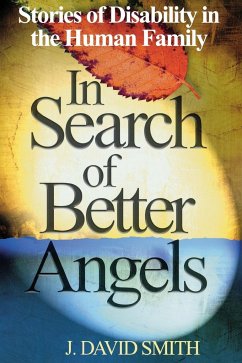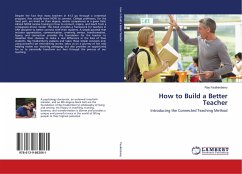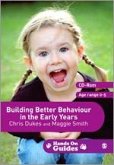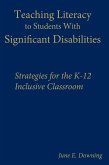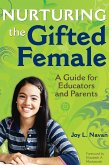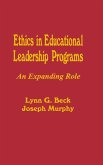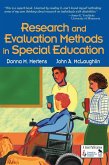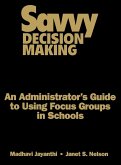- Gebundenes Buch
- Merkliste
- Auf die Merkliste
- Bewerten Bewerten
- Teilen
- Produkt teilen
- Produkterinnerung
- Produkterinnerung
This resource is a testament to the value of people with disabilities and the enrichment that we can find with them.
Andere Kunden interessierten sich auch für
![How to Build a Better Teacher How to Build a Better Teacher]() Ray FaulkenberryHow to Build a Better Teacher32,99 €
Ray FaulkenberryHow to Build a Better Teacher32,99 €![Building Better Behaviour in the Early Years Building Better Behaviour in the Early Years]() Chris DukesBuilding Better Behaviour in the Early Years193,99 €
Chris DukesBuilding Better Behaviour in the Early Years193,99 €![Teaching Literacy to Students with Significant Disabilities Teaching Literacy to Students with Significant Disabilities]() June E. DowningTeaching Literacy to Students with Significant Disabilities88,99 €
June E. DowningTeaching Literacy to Students with Significant Disabilities88,99 €![Nurturing the Gifted Female Nurturing the Gifted Female]() Joy L. NavanNurturing the Gifted Female77,99 €
Joy L. NavanNurturing the Gifted Female77,99 €![Ethics in Educational Leadership Programs Ethics in Educational Leadership Programs]() Lynn G. BeckEthics in Educational Leadership Programs57,99 €
Lynn G. BeckEthics in Educational Leadership Programs57,99 €![Research and Evaluation Methods in Special Education Research and Evaluation Methods in Special Education]() Donna M. MertensResearch and Evaluation Methods in Special Education98,99 €
Donna M. MertensResearch and Evaluation Methods in Special Education98,99 €![Savvy Decision Making Savvy Decision Making]() Madhavi JayanthiSavvy Decision Making80,99 €
Madhavi JayanthiSavvy Decision Making80,99 €-
-
-
This resource is a testament to the value of people with disabilities and the enrichment that we can find with them.
Hinweis: Dieser Artikel kann nur an eine deutsche Lieferadresse ausgeliefert werden.
Hinweis: Dieser Artikel kann nur an eine deutsche Lieferadresse ausgeliefert werden.
Produktdetails
- Produktdetails
- Verlag: Corwin
- Seitenzahl: 160
- Erscheinungstermin: 8. Mai 2003
- Englisch
- Abmessung: 260mm x 183mm x 13mm
- Gewicht: 509g
- ISBN-13: 9780761938408
- ISBN-10: 0761938400
- Artikelnr.: 22075506
- Herstellerkennzeichnung
- Produktsicherheitsverantwortliche/r
- Europaallee 1
- 36244 Bad Hersfeld
- gpsr@libri.de
- Verlag: Corwin
- Seitenzahl: 160
- Erscheinungstermin: 8. Mai 2003
- Englisch
- Abmessung: 260mm x 183mm x 13mm
- Gewicht: 509g
- ISBN-13: 9780761938408
- ISBN-10: 0761938400
- Artikelnr.: 22075506
- Herstellerkennzeichnung
- Produktsicherheitsverantwortliche/r
- Europaallee 1
- 36244 Bad Hersfeld
- gpsr@libri.de
J. David Smith is Provost and Senior Vice Chancellor at the University of Virginiäs College at Wise. He earned both baccalaureate and graduate degrees from Virginia Commonwealth University. He was awarded a second master¿s degree and his doctorate from Columbia University. His professional experience includes a work as a public school teacher and as a counselor. He and his wife, Joyce, served two years in Jamaica working as Peace Corps volunteers. Before coming to The University of Virginiäs College at Wise as Provost, he served as Dean of the School of Education and Human Services at Longwood University. He also served as Chair of the Department of Educational Psychology at the University of South Carolina. He began his higher education career at Lynchburg College. Smith has made numerous invited presentations to national and international audiences and regularly contributes to the professional literature on education, human services, and public policy through journal articles. He is the author of ten books. One of the integrating themes of his research and writing has been a concern for the rights and dignity of people with disabilities. Smith has devoted much of his scholarship to the study of the history of eugenics and its impact on social and educational policy, and he has also been active in addressing contemporary problems and issues in education.
Preface Acknowledgments Introduction: Power and Epiphany - Reflections on the Personal and Cultural Value of Disabilities Part I: My Own Journey 1. Disability and Revelation: Lessons Learned and Flying Squirrels 2. Learning to Love, Loving to Learn: Mike and the Clown Faces 3. Inclusion, Exclusion, and Other Matters of the Heart: The Story of Nan 4. Disabling Prejudice: Aunt Celie and the Marble Cake 5. Lessons in Patois: Learning to Be a Jamaican 6. A Father
s Proud Moment: The Day My Daughter Became a Gifted Samaritan 7. Recapturing the Spirit of Caring: Uncle, Brownie, and Sausage Biscuits Part I: Questions to Ponder Part II: Disability, Science, and Pseudoscience 8. Eugenics, Old and New: Mensa and the Human Genome Project The Tragedy of Involuntary Sterilization Eugenics Eugenics: A Continuing Legacy The Human Genome Project and Mental Retardation Mental Retardation, "Felt Necessities," and Ethics 9. Euguenics Revisited: Buck Versus Bell and The Bell Curve 10. Old Texts, Disabilities, and the Persistent Argument: For Whom the Bell Curves 11. Different Voices of Advocacy: Helen Keller and Burton Blatt Helen Keller: A Magnificent Exception Helen Keller and the Parameters of Advocacy Burton Blatt
s Advocacy: The Golden Rule and Beyond Legacies and Challenges 12. A Place or No Place for Disabilities: Disney
s Tarzan, Edgar Rice Burroughs
Eugenics, and Visions of Utopian Perfection Tarzan and the Triumph of Heredity Burroughs on Genetic Predetermination Burroughs on Breeding for Utopia Utopia and Disabilities 13. The Polio Vaccine Research and Children With Disabilities: Sacrifices for the Miracle Personal Reflections on Polio The Salk Vaccine and "Institutionalized" Research Feeding Live Polio Virus to Children With Disabilites Research and Disabilities: Other Cases Claiming a Place of Value for People With Disabilities: The Continuing Struggle Part II: Questions to Ponder Part III: Disability in Historical and Literary Perspectives 14. Disability and the Need for Romantic Science: Darwin
s Last Child 15. Words of Understanding, Concepts of Inclusiveness: The Wisdom of Margaret Mead 16. The Question of Differential Advocacy: Laura Bridgman Constructing the Disability of Mental Retardation Disability and Invisibility Laura Bridgman: The First Miracle 17. Disabilities and the Challenges of Equality: Looking Backward, Looking Forward Looking Backward Looking Forward 18. Diversity and Disability: Individuality and Mental Retardation A Memory From Ignacy Goldberg Jack London
s "Told in the Drooling Ward" The Typology of Mental Retardation Mental Retardation: Redefining or Disaggregating? Part III: Questions to Ponder Epilogue: Finding a Voice - The Story of Bill Index
s Proud Moment: The Day My Daughter Became a Gifted Samaritan 7. Recapturing the Spirit of Caring: Uncle, Brownie, and Sausage Biscuits Part I: Questions to Ponder Part II: Disability, Science, and Pseudoscience 8. Eugenics, Old and New: Mensa and the Human Genome Project The Tragedy of Involuntary Sterilization Eugenics Eugenics: A Continuing Legacy The Human Genome Project and Mental Retardation Mental Retardation, "Felt Necessities," and Ethics 9. Euguenics Revisited: Buck Versus Bell and The Bell Curve 10. Old Texts, Disabilities, and the Persistent Argument: For Whom the Bell Curves 11. Different Voices of Advocacy: Helen Keller and Burton Blatt Helen Keller: A Magnificent Exception Helen Keller and the Parameters of Advocacy Burton Blatt
s Advocacy: The Golden Rule and Beyond Legacies and Challenges 12. A Place or No Place for Disabilities: Disney
s Tarzan, Edgar Rice Burroughs
Eugenics, and Visions of Utopian Perfection Tarzan and the Triumph of Heredity Burroughs on Genetic Predetermination Burroughs on Breeding for Utopia Utopia and Disabilities 13. The Polio Vaccine Research and Children With Disabilities: Sacrifices for the Miracle Personal Reflections on Polio The Salk Vaccine and "Institutionalized" Research Feeding Live Polio Virus to Children With Disabilites Research and Disabilities: Other Cases Claiming a Place of Value for People With Disabilities: The Continuing Struggle Part II: Questions to Ponder Part III: Disability in Historical and Literary Perspectives 14. Disability and the Need for Romantic Science: Darwin
s Last Child 15. Words of Understanding, Concepts of Inclusiveness: The Wisdom of Margaret Mead 16. The Question of Differential Advocacy: Laura Bridgman Constructing the Disability of Mental Retardation Disability and Invisibility Laura Bridgman: The First Miracle 17. Disabilities and the Challenges of Equality: Looking Backward, Looking Forward Looking Backward Looking Forward 18. Diversity and Disability: Individuality and Mental Retardation A Memory From Ignacy Goldberg Jack London
s "Told in the Drooling Ward" The Typology of Mental Retardation Mental Retardation: Redefining or Disaggregating? Part III: Questions to Ponder Epilogue: Finding a Voice - The Story of Bill Index
Preface Acknowledgments Introduction: Power and Epiphany - Reflections on the Personal and Cultural Value of Disabilities Part I: My Own Journey 1. Disability and Revelation: Lessons Learned and Flying Squirrels 2. Learning to Love, Loving to Learn: Mike and the Clown Faces 3. Inclusion, Exclusion, and Other Matters of the Heart: The Story of Nan 4. Disabling Prejudice: Aunt Celie and the Marble Cake 5. Lessons in Patois: Learning to Be a Jamaican 6. A Father
s Proud Moment: The Day My Daughter Became a Gifted Samaritan 7. Recapturing the Spirit of Caring: Uncle, Brownie, and Sausage Biscuits Part I: Questions to Ponder Part II: Disability, Science, and Pseudoscience 8. Eugenics, Old and New: Mensa and the Human Genome Project The Tragedy of Involuntary Sterilization Eugenics Eugenics: A Continuing Legacy The Human Genome Project and Mental Retardation Mental Retardation, "Felt Necessities," and Ethics 9. Euguenics Revisited: Buck Versus Bell and The Bell Curve 10. Old Texts, Disabilities, and the Persistent Argument: For Whom the Bell Curves 11. Different Voices of Advocacy: Helen Keller and Burton Blatt Helen Keller: A Magnificent Exception Helen Keller and the Parameters of Advocacy Burton Blatt
s Advocacy: The Golden Rule and Beyond Legacies and Challenges 12. A Place or No Place for Disabilities: Disney
s Tarzan, Edgar Rice Burroughs
Eugenics, and Visions of Utopian Perfection Tarzan and the Triumph of Heredity Burroughs on Genetic Predetermination Burroughs on Breeding for Utopia Utopia and Disabilities 13. The Polio Vaccine Research and Children With Disabilities: Sacrifices for the Miracle Personal Reflections on Polio The Salk Vaccine and "Institutionalized" Research Feeding Live Polio Virus to Children With Disabilites Research and Disabilities: Other Cases Claiming a Place of Value for People With Disabilities: The Continuing Struggle Part II: Questions to Ponder Part III: Disability in Historical and Literary Perspectives 14. Disability and the Need for Romantic Science: Darwin
s Last Child 15. Words of Understanding, Concepts of Inclusiveness: The Wisdom of Margaret Mead 16. The Question of Differential Advocacy: Laura Bridgman Constructing the Disability of Mental Retardation Disability and Invisibility Laura Bridgman: The First Miracle 17. Disabilities and the Challenges of Equality: Looking Backward, Looking Forward Looking Backward Looking Forward 18. Diversity and Disability: Individuality and Mental Retardation A Memory From Ignacy Goldberg Jack London
s "Told in the Drooling Ward" The Typology of Mental Retardation Mental Retardation: Redefining or Disaggregating? Part III: Questions to Ponder Epilogue: Finding a Voice - The Story of Bill Index
s Proud Moment: The Day My Daughter Became a Gifted Samaritan 7. Recapturing the Spirit of Caring: Uncle, Brownie, and Sausage Biscuits Part I: Questions to Ponder Part II: Disability, Science, and Pseudoscience 8. Eugenics, Old and New: Mensa and the Human Genome Project The Tragedy of Involuntary Sterilization Eugenics Eugenics: A Continuing Legacy The Human Genome Project and Mental Retardation Mental Retardation, "Felt Necessities," and Ethics 9. Euguenics Revisited: Buck Versus Bell and The Bell Curve 10. Old Texts, Disabilities, and the Persistent Argument: For Whom the Bell Curves 11. Different Voices of Advocacy: Helen Keller and Burton Blatt Helen Keller: A Magnificent Exception Helen Keller and the Parameters of Advocacy Burton Blatt
s Advocacy: The Golden Rule and Beyond Legacies and Challenges 12. A Place or No Place for Disabilities: Disney
s Tarzan, Edgar Rice Burroughs
Eugenics, and Visions of Utopian Perfection Tarzan and the Triumph of Heredity Burroughs on Genetic Predetermination Burroughs on Breeding for Utopia Utopia and Disabilities 13. The Polio Vaccine Research and Children With Disabilities: Sacrifices for the Miracle Personal Reflections on Polio The Salk Vaccine and "Institutionalized" Research Feeding Live Polio Virus to Children With Disabilites Research and Disabilities: Other Cases Claiming a Place of Value for People With Disabilities: The Continuing Struggle Part II: Questions to Ponder Part III: Disability in Historical and Literary Perspectives 14. Disability and the Need for Romantic Science: Darwin
s Last Child 15. Words of Understanding, Concepts of Inclusiveness: The Wisdom of Margaret Mead 16. The Question of Differential Advocacy: Laura Bridgman Constructing the Disability of Mental Retardation Disability and Invisibility Laura Bridgman: The First Miracle 17. Disabilities and the Challenges of Equality: Looking Backward, Looking Forward Looking Backward Looking Forward 18. Diversity and Disability: Individuality and Mental Retardation A Memory From Ignacy Goldberg Jack London
s "Told in the Drooling Ward" The Typology of Mental Retardation Mental Retardation: Redefining or Disaggregating? Part III: Questions to Ponder Epilogue: Finding a Voice - The Story of Bill Index

